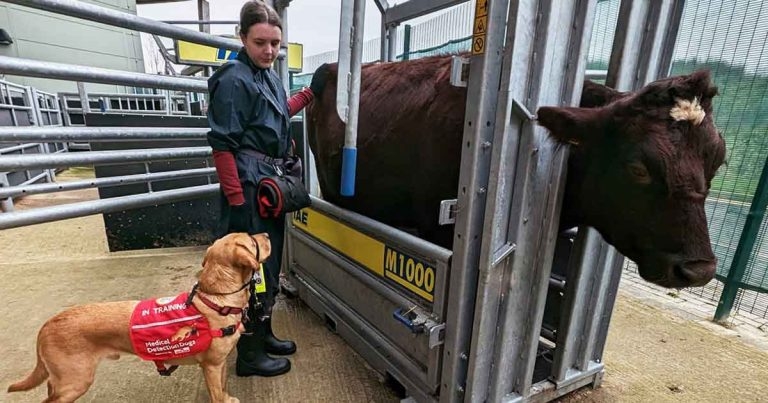10 May 2024
Jade Heaney was forced to take a sabbatical from her course to manage her postural tachycardia syndrome, a condition that causes rapid increases in heart rate after getting up or lying down.

Jade Heaney and specially trained assistance dog Jules have formed a perfect partnership.
A Surrey vet school student who suffers with a heart condition has been able to return to her studies and the dream of becoming a vet thanks to the help of a specially trained assistance dog.
Second-year student Jade Heaney (pictured above) was forced to take a sabbatical from her course to manage her postural tachycardia syndrome (PoTS), a condition that causes rapid increases in heart rate after getting up or lying down.
While it can be managed with lifestyle changes, episodes can often fluctuate throughout the day.
Having had her first episode at 12 years old, Miss Heaney has learned about her condition and what works well for her, but leaving her home in Northern Ireland to study in England has brought new challenges.
In her first year, Miss Heaney explained that she was not allowed to do any off-site practicals or those involving large animals, because of a high risk she would lose consciousness without any warning in these types of environments.
The practical teaching she did get to attend was overshadowed by worry that she would lose consciousness in front of everyone and injure herself.
Living in university accommodation also brought new “fear and isolation”, and Jade decided she had no choice but to take time out halfway through her second year.
But now she has returned to her studies having been matched with Jules via Medical Detection Dogs – a charity that trains dogs to support individuals with complex health conditions who have limited awareness of an impending life-threatening medical event.
Using his highly sensitive sense of smell, Jules has been trained to detect minute odour changes prior to emergency situations, allowing preventive interventions.
Jules alerts Jade prior to an episode associated with PoTS and allows her time to get herself into a safe space or stop the task she is doing. He then stays with his partner until the episode passes and Jade is able to continue with her day.
As a result of having Jules, Jade is now thriving on her veterinary degree course and is revelling in her new sense of independence.
She said: “Now that I have been matched with my special miracle boy, Jules, he has made a world of difference, and my whole life is so much brighter. He keeps me safe – whether it be in my uni flat, out in public in shops or public transport, or anywhere in vet school, including lectures, dry labs, clinical skills, the pathology lab and around large animals.
“Now that Jules is by my side, my life feels so much brighter – not just physically because of the lack of concussions, but because he has lit up my life due to the safety he brings and his infectious, energetic personality.
“I can never put into words how much Jules means to me, how much he has already changed my life, and how much I love and appreciate him. He is my lifesaving miracle dog who has finally been my light at the end of a very long, dark tunnel.”
A spokesperson for Medical Detection Dogs added: “This has all been possible due to a lot of preparation, discussion, planning and hard work, alongside a willingness to make it work from the University of Surrey School of Veterinary Medicine, which has been brilliant.”
The British Veterinary Chronic Illness Society (BVCIS) – an organisation that works to widen participation within the veterinary sector – also welcomed the news.
A BVCIS spokesperson said: “The BVCIS is always delighted to hear stories highlighting the value of reasonable adjustment to enable continuous and return to study and/or work. Assistance dogs, including medical alert dogs, empower and enable those with often invisible disabilities to participate more fully in everyday life.
“Welcoming assistance dogs is part of how we build an accessible and inclusive industry for those working with disability.”